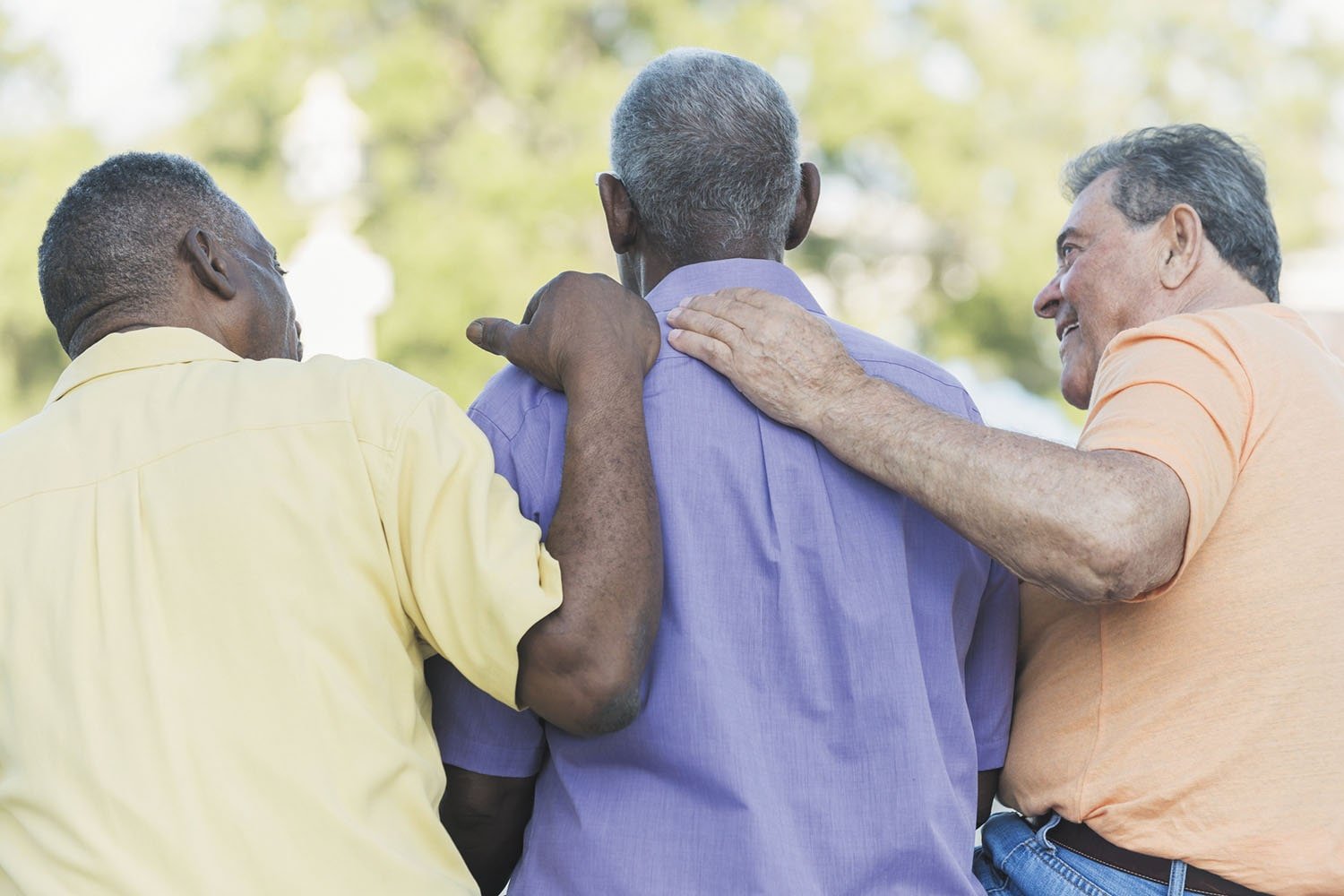Loss of Parent Community
Losing a parent can leave you feeling empty, lonely and potentially isolated
No matter the reason or even the amount of advance notice you might have, losing a parent leaves you feeling powerful emotions of emptiness, loneliness and potentially isolation. Healthy parent relationships can provide an umbrella of emotional protection over us, and the loss of companionship when a parent dies may leave us feeling alone and without support. Someone we worked hard to make proud is no longer there to witness our life.



Following the loss of a parent, it is important to take good care of yourself in every way.
- Grief is exhausting and you will need to work hard to get plenty of quality sleep
- Eating healthy food will be a key, and simple exercise like walking combined with sunshine and fresh air will help you physically
- For your mental health you will need help with how to think about your loss. Tools are available to help you deal with recurring traumatic images
- Reflecting on the meaning and purpose of your loss will strengthen your spiritual life, and surrounding yourself with a few positive, loving people will provide much-needed support
- Your emotional battery will drain quickly so find ways to charge it regularly by treating yourself and remembering your own worth and value against the background of your loss
- Seek companionship in your grief and take every opportunity to talk about what you are experiencing with people you trust
We can connect you with others whose parent age or season of life is similar to yours, and we also include connection for loss of a grandparent, as well as a significant person functioning in the role of parent.
Community Connection
Grief doesn't simply go away... you need help.
- Connect with others who have experienced your same loss
- Interact through workshops on loss topics
- Find help through print resources you can view or download
Loss of Parent Community
Bringing grieving people together to heal.
We Grieve offers companionship and support for healthy healing through connection in loss communities, virtual workshops, and print resources.
No matter the reason or even the amount of advance notice you might have, losing a parent leaves you feeling powerful emotions of emptiness, loneliness and potentially isolation. Healthy parent relationships can provide an umbrella of emotional protection over us, and the loss of companionship when a parent dies may leave us feeling alone and without support. Someone we worked hard to make proud is no longer there to witness our life.
The Loss of Parent community includes parents, grandparents, and others who fill the significant role of pseudo parents.
Common Reactions to the Loss of a Parent or Grandparent
Reactions Varied & Unique
Reactions to the loss of a parent or grandparent are so different because of both the complexity of a parent relationship and the wide range of experiences people have with their parents and parent figures. One reason a healthy parent relationship is complex is the number of stages a relationship with a parent undergoes. Parents start out making every decision possible for us as children, and their influence over us is very strong. Gradually that influence wanes as the influence of peers rises through adolescence, and the relationship begins to change. Our view of our parents takes another drastic change during young adulthood where the quality of the roots our parents gave us is tested, and we begin to spread our wings and declare our independence. The relationship we have with our parents throughout our adult years can take on the qualities of a peer relationship, but then later in life move to one where we may become caregivers for our parents.
These stages are additionally complex because the quality of attachment, involvement, communication, meaningful experiences, acceptance without judgment, and love without condition will determine what a child or grandchild grieves as being lost when a parent dies. In other words, no two children grieve the loss of a parent figure the same way. Giving thought to your particular journey with your parent will help you understand the wide range of emotions you may be experiencing.
Loss of Identity
The death of a parent creates a loss of identity. In many ways parent figures are like mirrors in which we see ourselves to measure our worth and value. I am not recommending this; I am simply stating that it is what people tend to do. And when there is no more mirror, we experience a loss of identity and are forced to look elsewhere to calculate self-worth, and this creates a crisis of identity. The recalculation of our worth and value can be a positive experience but is often overshadowed by the loss itself.
Loss of Security
In a healthy relationship the parent serves as a sort of umbrella of protection over us as children. As we grow into independent responsible adults the protection is less physical and more emotional or psychological. With living parents, we are not the “last line of defense” or the elder generation. The ability to personally access the wisdom, experience and story of our living parents creates a sense of safety and security. With the passing of our parents and the perception that the umbrella is no longer there to protect us we experience a loss of security and feelings of exposure, loneliness, emptiness, and a shift in the weight of responsibility. Our protector and provider can no longer protect and provide, and for many that reality can be scary. Parents tend to be strong figures in our lives and the impact of the loss can be felt deeply.
Loss of Influence
In many families a strong parent may have been the force who essentially held the extended family together through difficult times, relational conflicts between family members, economic challenges, or other types of adversity. This influential parent may have been the moral compass for the family, driving a strong value system with commensurate expectations of behavior. This parent may have set the bar of commitment for the frequency of family gatherings, or expectations of how holidays were celebrated. With the passing of this parent, the void seems larger than life and the emptiness felt by all. Family members may be wondering who will rise to fill the gap, or worried that there is no one capable of the job. Without leadership the extended family structure may begin to disintegrate or morph into something family members find less than desirable. Influential parents leave a large hole in the family system.
Loss of Connection
The passing of a parent is a harsh reminder that nothing in this life is permanent. The years we have with our parents can lull us into a sense of complacency that we will always have our parents nearby. We tend not to perseverate on the time when our parents will no longer be available. Losing a parent creates an empty feeling when you absent-mindedly pick up the phone to call them to ask a question, or to text something about your day, and you realize they are not there to answer back on the other end. Who is going to help you with how to release the jammed garbage disposal, change a flat tire, find the water shut-off valve, clean the wine stain out of the carpet, cook a prime rib to perfection, or set the table for a holiday dinner? Parents were helpful but for many of us they were also people who had our back, cared when we were sad, and wanted to hear from us as often as possible. The primary loss of realizing they are gone precedes the secondary losses of all the little reminders of what our parents meant to us, and both create huge amounts of emotional pain associated with each memory.
Conflicting and Complicated Thoughts and Emotions
So far, we have described common reactions to healthy parent/child relationships. But what about those relationships that were not as healthy, and represent painful memories? Grieving the loss of a parent with whom you had a strained or broken relationship can be excruciating and complicated. While you might rather stuff these difficult emotions, grieving can be an excellent opportunity to unpack them, process the painful experiences, assign and take blame, accept whatever reality is beyond your ability to change, let go of anger and bitterness, and then repack them and put them away.
It is a normal experience to be angry with someone you loved when they are gone. Holding on to that anger will not be productive and can be resolved with work and time. Until you choose to work on the negative memories, it will be best to focus on the good memories and all that you have to be grateful for in your parent.
Helpful Resources for the Loss of a Parent or Grandparent

We Grieve Workshops
Grief Workshops are open to all loss communities and are offered on a variety of topics.
Grief Workshops utilize a virtual platform and include teaching and small group, loss-specific breakouts with discussion enabled by a trained community facilitator. Workshops are scheduled for 90-minute sessions meeting weekly for four consecutive weeks.



Make a Donation
If the We Grieve Community experience has been valuable to you, give back.
Your donation will go to offset the cost of We Grieve, and allow us to continue offering free resources, workshops, and connection for grieving people.
Make a Donation



